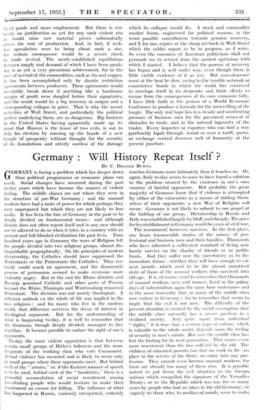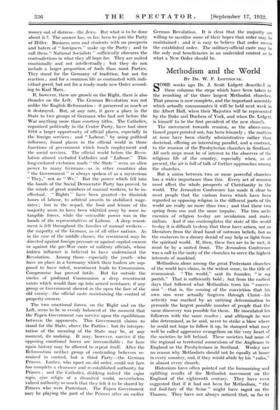Germany : Will History Repeat Itself ?
By C. BELISLE BURNS.
GERMANY is facing a problem which lies deeper down than political programmes or economic plans can reach. Social changes have occurred during the past twelve years which have become the sources of violent feeling. The middle classes are not where they were in the structure of pre-War Germany ; and the manual workers have had a taste of power for which perhaps they were unprepared but which they are not likely to lose easily. It has been the fate of Germany in the past to be deeply divided on fundamental issues : and although history does not often repeat itself and in any case should not be allowed to do so when it tries, in a country with an ancient and full-blooded civilization the past lives. Four hundred years ago in Germany the wars of Religion left the people divided into two religious groups, almost dis- tinguishable geographically. On the principles of modern dictatorship, the Catholics should have suppressed the Protestants or the Protestants the Catholics. They cer-. tainly could reach no agreement, and the democratic process of persuasion seemed to make everyone more violently angry. But in the end the Rhine districts and Bavaria remained Catholic and other parts of Prussia beyond the Rhine, Thuringia and Wurttemberg remained Protestant. The division was not merely theological. A different outlook cn the whole of life was implied in the two religions : and for many who live in the modern world, that difference survives the decay of interest in theological argument. But for the understanding of what is happening to-day, it is well to remember that the Germans, though deeply divided, managed to live together. It became possible to endure the sight of one's opponents. • To-day the most violent opposition is that between certain small groups of Hitler's followers and the more desperate of the working class who vote Communist. Actual violence has occurred and is likely to occur only in small groups where these opponents meet. But behind each of the " armies," or, if the Eastern manner of speech is to be used, behind each of the " banditries," there is a powerful accumulation of social resentment among law-abiding people who would hesitate to make their resentment an excuse for killing. The influence of what has happened in Russia, variously interpreted, certainly touches Germans more intimately than it touches us. Or, again, Italy to-day seems to some to have found a solution to the problem created by the existence in one's own country of hateful opponents. But probably the great majority of Germans know that if violence is attempted by either of the extremists as a means of ridding them- selves of their opponents, a new War of Religion will occur. Germany is not likely to submit to one gospel at the bidding of one group. Dictatorship in Russia and Italy was established largely by bluff, and cheaply. The price for its establishment in Germany would be years of civil war.
The resentment; however, survives. In the first place, one hears innumerable stories of the misery of pro- fessional and business men and their families. Thousands who have inherited a cultivated standard of living now barely survive on the charity of friends or on public funds. And they suffer now the uncertainty as to the immediate future—whether they will have enough to eat next month—which used to be the almost unnoticed state of those of the manual workers who survived into old age. It is, of course, cruel to remember that thousands of manual workers, men and women, lived in the palmy days of industrialism upon the same bare sustenance and in the same insecurity that so many of the middle class now endure in Germany : for to remember that seems to imply that the evil is not new. The difficulty of the present situation is created by the social assumption that the middle class naturally has a secure position in a civilized society. And quite apart from individual rights," it is true that a certain type of culture. which is valuable to the whole world, depends upon the feeling of security in men's minds. But now the middle class has lost the footing for its next generation. That causes even more resentment than the loss suffered by the old. The children of educated parents can find no work to do—no► place in the service of the State, no entry into any pro- fession. They cannot even become manual workers, for there are already too many of these also. It is possible indeed to put down the evil situation to the foreign nations which compelled the signature of the Versailles Treaty ; or to the Republic which was run for so many years by people who had no place in the old Germany ; or vaguely to those who, to mediaeval minds, seem to make money out of distress—the Jews. But what is to be done about it ?. The answer has, so far, been to join the Party of Hitler. Business men and students with no prospects and haters of " foreigners " make up the Party ; and to call them " National Socialists " sufficiently obscures the contradictions in what they all hope for. They are united emotionally and not intellectually ; but they do not include a larger proportion of fools than most Parties. They stand for the Germany of tradition, but not for reaction ; and for a common life as contrasted with indi- vidual greed, but not for a ready-made new Order accord- ing to Karl Marx.
If, however, there are growls on the Right, there is also thunder on the Left. The German Revolution was not unlike the English Reformation : it preserved as much as it destroyed. But, at any rate, it gave a place in the State to two groups of Germans who had not before the War anything more than courtesy titles. The Catholics, organized politically in the Centre Party, have had since 1918 a larger opportunity of official places, especially in the foreign services : and " Labour," by using political influence, found places in the official world in those functions of government which touch employment and the social services. The official world before the Revo- lution almost excluded Catholics and " Labour." This long-endured exclusion made " the State " seem an alien power to many Germans—as in other countries also " the Government " is always spoken of as a mysterious " They," not as " We." But the power which fell into the hands of the Social Democratic Party has proved, to the minds of great numbers of manual workers, to be in- effectual. " Rights " have been granted—to diminish hours of labour, to arbitral awards to stabilized wage- rates ; but in the sequel, the food and leisure of the majority seem to have been whittled away by some in- tangible forces, while the ostensible power was in the hands of the representatives of Labour. A deep resent- ment is felt throughout the families of manual workers— the majority of the German, as of all other nations. As in the case of the middle classes, the resentment may be directed against foreign pressure or against capital owners or against the pre-War caste of military officials, whose hidden influence is believed to have undermined the Revolution. Among those—especially the youth—who have no place in a Germany which their leaders are sup- posed to have ruled, resentment leads to Communism. Compromise has proved futile. But far outside the circles of profound Communism a deep resentment exists which would flare up into armed resistance, if any group or Government showed in the open the face of the old enemy—the official caste maintaining the control of property-owners.
The two emotional forces, on the Right and on the Left, seem to be so evenly balanced at the moment that the Papen Government can survive upon the equilibrium between the opponents. This Government claims to stand for the State, above the Parties : but its interpre- tation of the meaning of the State may be, at any moment, its undoing. It may, however, survive if the opposing emotional forces are irreconcilable : for here again history may be allowed to repeat itself. After the Reformation neither group of contending believers re- mained in control, but a third Party—the German Princes. Luther, who upset an old order, couki not face too complete a clearance and re-established authority for Princes : and the Catholics, disliking indeed the cujus regio, ejus religio of a disunited world, nevertheless valued authority so much that they left it to be shared by Princes who were Protestant. The Papen Government may be playing the part of the Princes after an earlier German Revolution. It is clear that the majority are willing to sacrifice some of their hopes that order may be maintained : and it is easy to believe that order means the established order. The military-official caste may be the only real beneficiaries in an undecided contest as to what a New Order should be.































 Previous page
Previous page